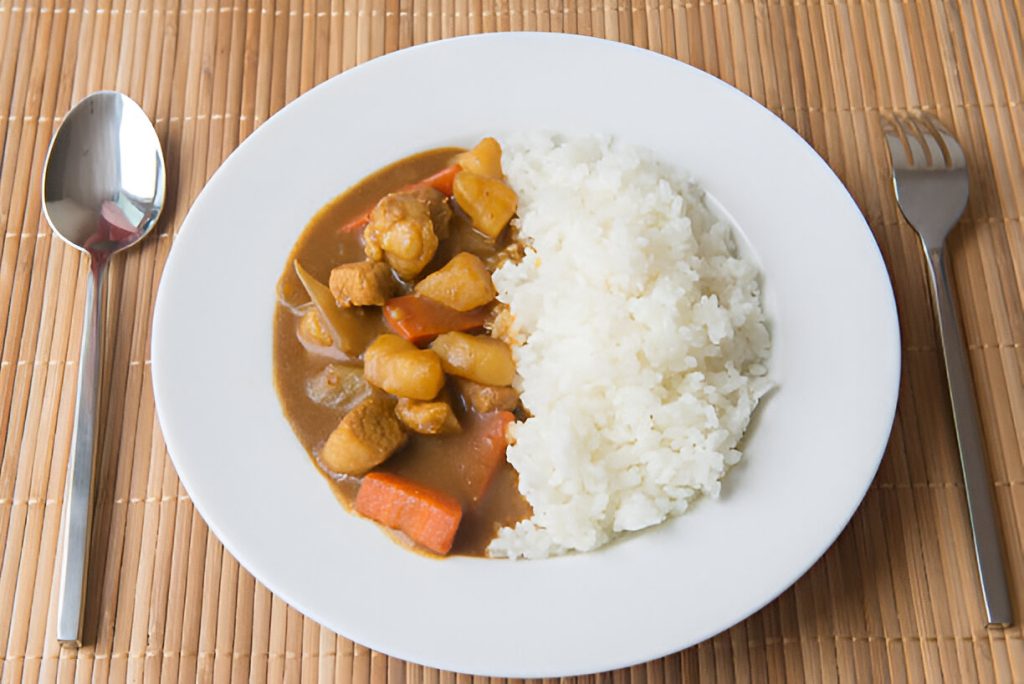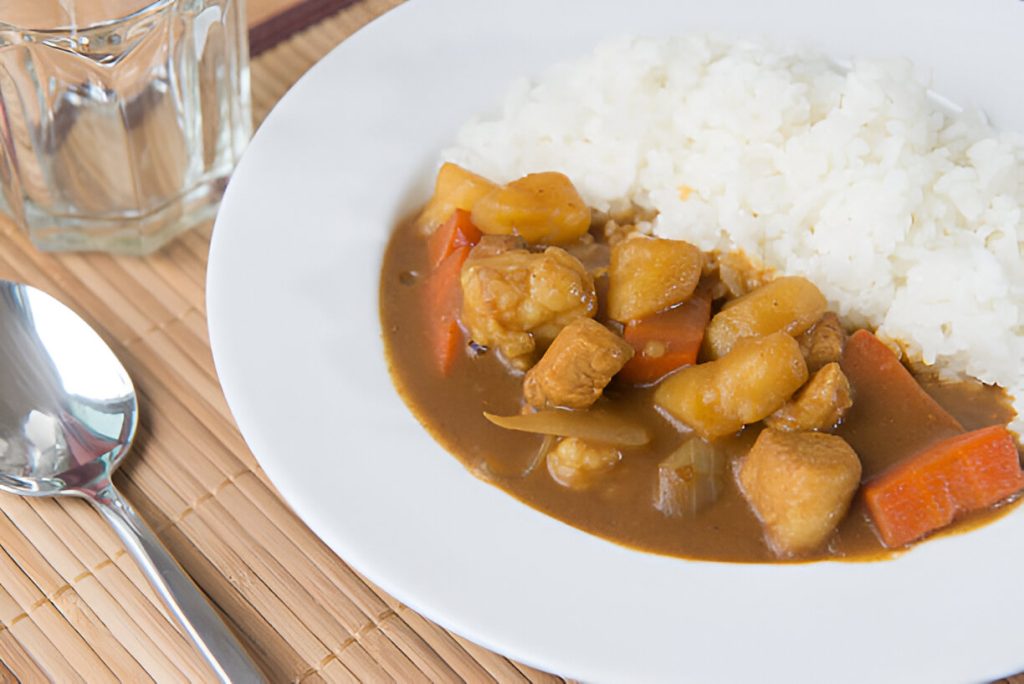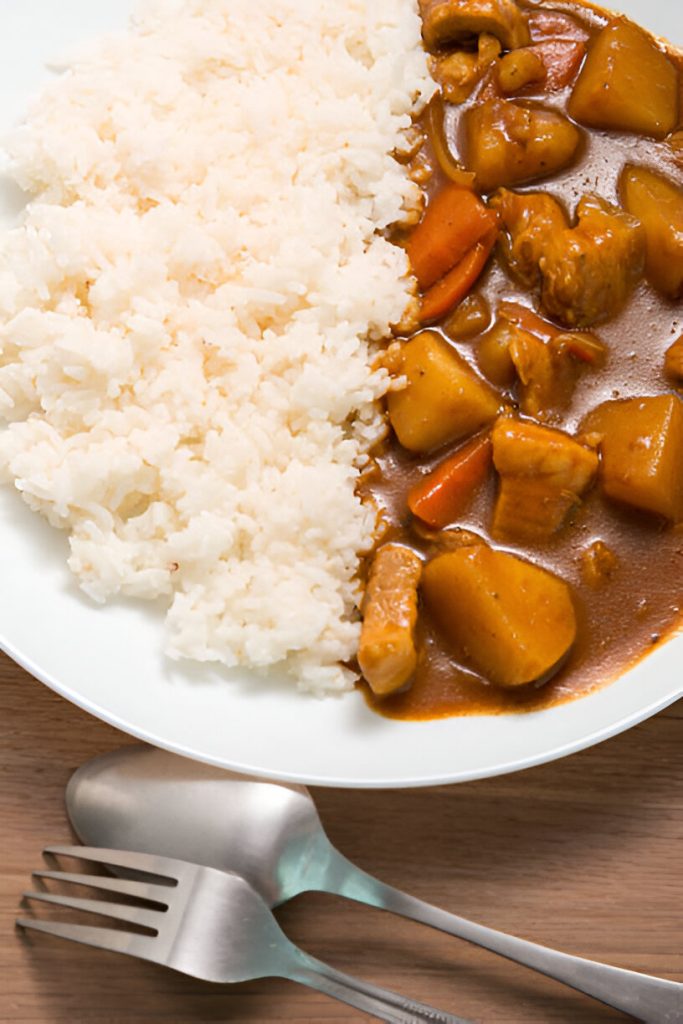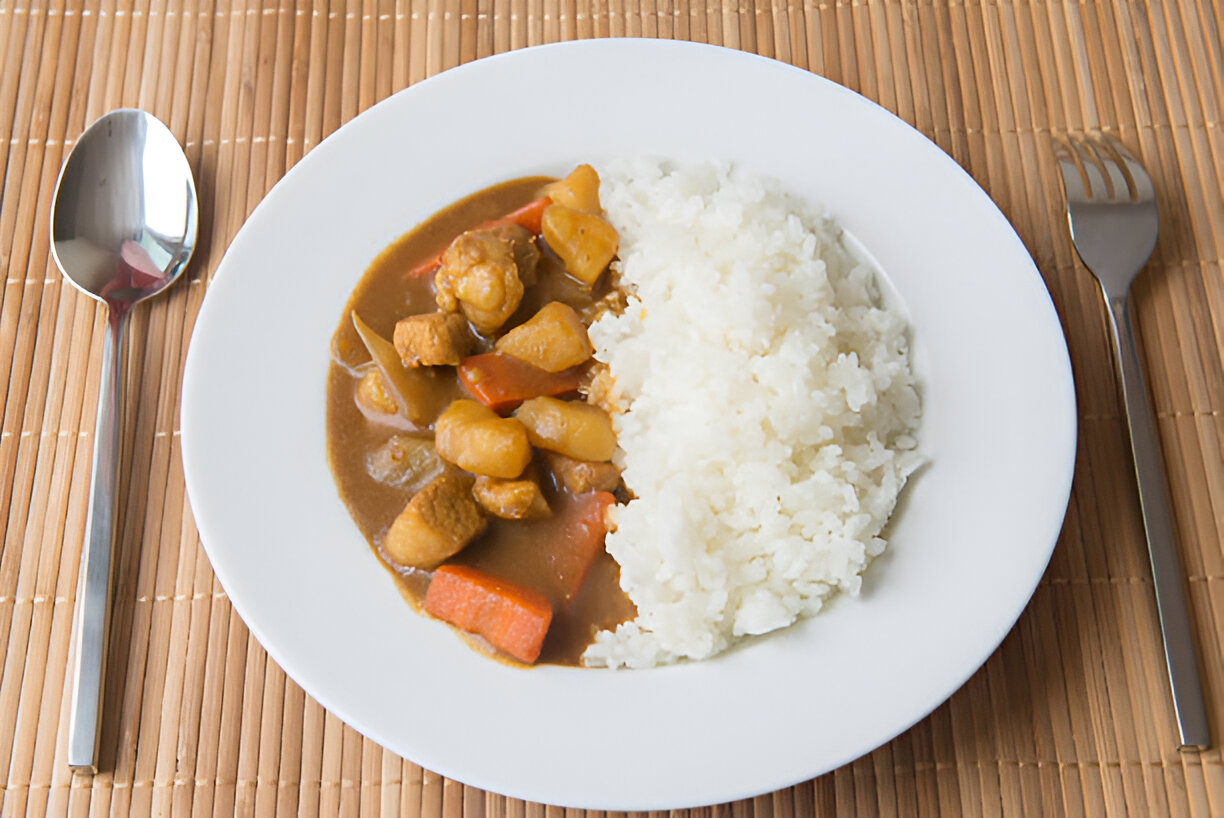Japanese Curry with Rice Recipe
Japanese curry is a culinary treasure with a depth of flavors that captivates the taste buds and brings a cozy warmth to the soul. Known for its rich, mildly spiced sauce and tender chunks of meat and vegetables, this dish is a comforting blend of savory, sweet, and umami flavors. The harmony of spices and sweetness, often derived from unexpected ingredients like grated apple, makes Japanese curry unique and beloved. This satisfying meal is a great choice for family dinners, adding warmth and comfort to any table.

Ingredients Overview
A successful Japanese curry starts with high-quality ingredients. Fresh vegetables, such as onions, potatoes, and carrots, bring texture and natural sweetness, while boneless, skinless chicken thighs provide tender, juicy meat that enriches the curry’s flavor. Adding a grated apple is a delightful twist; it infuses the sauce with a subtle, natural sweetness that balances the savory richness.
For those who wish to make adjustments, this recipe is versatile. Chicken thighs are the traditional choice, but you can easily substitute them with beef or even go vegetarian by using tofu or extra vegetables. The curry roux, typically available in blocks, is the heart of this dish and brings depth to the sauce. With thoughtful swaps and adaptations, this dish can cater to different tastes and dietary preferences, making it as adaptable as it is comforting.
Step-by-Step Cooking Instructions
Preparing the Chicken and Vegetables
Begin by cutting the chicken thighs into bite-sized pieces, ensuring they are easy to eat and evenly distributed throughout the curry. Lightly season them with freshly ground black pepper for added flavor. Moving on to the vegetables, slice the onions thinly; they will caramelize as they cook, creating a sweet base for the curry. The carrots can be cut into round slices or half-moons, depending on their size, while the potatoes should be diced into small, even chunks to ensure they cook through and add body to the dish. Grate the ginger and apple, adding a touch of zest and sweetness, and mince the garlic to intensify the aromatics in the curry.
Sautéing for Flavor Depth
In a large pot, heat the neutral oil over medium heat. Add the sliced onions, stirring occasionally as they turn golden brown and release their natural sweetness. This step is key in creating a depth of flavor that sets Japanese curry apart from other curries. Once the onions are caramelized, add the garlic and ginger, stirring briefly until their fragrance fills the air. Introduce the seasoned chicken to the pot and cook until it loses its pink hue, sealing in its juices and enhancing the flavor profile.
Simmering and Developing the Curry Sauce
Pour in the chicken stock or water, along with the carrots and potatoes. The broth serves as a savory base that complements the vegetables’ earthy sweetness. Add honey for a touch of sweetness, soy sauce for umami depth, and ketchup for a hint of acidity and richness. Allow the curry to simmer on low to medium heat, letting the ingredients meld and the flavors intensify. Skim any foam that rises to the surface for a cleaner, more refined sauce. After 20-30 minutes, the vegetables should be tender, and the sauce will have thickened slightly.
Adding the Curry Roux for Richness
Break the curry roux into smaller pieces and add them to the pot, stirring gently to help them dissolve. As the roux melts, it thickens the sauce, adding a rich, velvety texture that coats each piece of meat and vegetable. For a perfect consistency, adjust with a little extra water or broth if needed, ensuring the sauce remains creamy without being too thick.

Recipe Tips & Frequently Asked Questions
Achieving the Ideal Consistency:
Adjust the thickness by simmering longer for a richer sauce or adding more broth if it’s too thick.
Enhancing Flavors:
Boost flavor with a splash of Worcestershire sauce or soy sauce for extra umami.
Ingredient Alternatives and Customizations:
Swap chicken for beef or tofu, or add mushrooms, bell peppers, or other vegetables for variety.
Can I Make This Curry Spicier?
Add cayenne pepper, red pepper flakes, or fresh chili for more heat.
What Can I Use as a Substitute for Japanese Curry Roux?
Make a roux with flour, butter, and curry powder if pre-made roux is unavailable.
How Should I Store and Reheat Leftovers?
Refrigerate in an airtight container for up to three days, reheating over low heat.
Can I Make This Recipe Gluten-Free?
Use gluten-free curry roux and tamari instead of soy sauce.
What to Serve with This Recipe
A perfect serving of Japanese curry calls for fluffy steamed rice, which absorbs the sauce beautifully. Jasmine or short-grain rice are excellent options, though brown rice adds a nutty flavor and chewy texture. To create a more balanced meal, consider pairing the curry with Japanese pickles, which add a refreshing contrast, or a simple green salad dressed with a light vinaigrette to cleanse the palate.
For garnish, sprinkle freshly chopped green onions, sesame seeds, or even a touch of red pepper flakes for an extra burst of flavor and a hint of spice. These additions enhance both the presentation and taste of the curry, making it visually appealing and satisfying in every bite.
Recipe Variations and Ideas
For those seeking a twist on the traditional, there are endless possibilities. Adding boiled eggs, mushrooms, or a splash of coconut milk can introduce new flavors and textures. A hard-boiled egg adds richness, while mushrooms lend an earthy depth, and coconut milk brings a hint of creaminess that elevates the sauce.
Adapting this recipe for different diets is also straightforward. To make a vegan version, replace the chicken with tofu and use vegetable stock instead of chicken broth. Opt for gluten-free curry roux to accommodate dietary restrictions, ensuring everyone at the table can enjoy this dish.
Storage and Reheating Tips
Japanese curry makes wonderful leftovers, as the flavors deepen and intensify over time. For storage, transfer the curry to an airtight container and refrigerate for up to three days. To freeze, place in a freezer-safe container, leaving room for expansion, and store for up to a month. When reheating, warm the curry over low heat to maintain its smooth consistency and rich flavor, stirring occasionally to prevent sticking.
Japanese curry is a hearty, adaptable dish that brings comfort and satisfaction to any table. Its balance of savory, sweet, and slightly spicy notes makes it perfect for cozy nights and gatherings alike. With simple ingredients and a few easy steps, this curry is accessible for cooks of all levels, delivering a memorable meal that brings warmth to any occasion.

Ingredients
1½ lb boneless, skinless chicken thighs (alternative cuts can be used; see Notes for ideas)
2 large onions (1.5 lb, 670 g)
3 Yukon gold potatoes (15 oz, 432 g)
2 carrots (6.7 oz, 190 g)
2 cloves garlic, minced
1 tsp fresh ginger, grated
½ apple (6 oz, 170 g), grated for sweetness
Freshly ground black pepper, to season
For the Curry Sauce
1½ Tbsp neutral oil (for sautéing)
4 cups chicken broth or stock (for a milder taste, you may use water or a mix of half stock and half water)
1 Tbsp soy sauce
1 Tbsp honey
1 Tbsp ketchup
1 package Japanese curry roux (7–8 oz or 200–230 g, or homemade Japanese curry roux if preferred)
Instructions
Begin by prepping your ingredients. Cut the chicken thighs into bite-sized pieces and season lightly with freshly ground black pepper. Set aside while you prepare the vegetables.
Slice the onions thinly and cut the carrots into round slices, or half-moons if they’re larger. Dice the potatoes into small chunks to help them cook evenly. Grate the ginger and apple, and mince the garlic.
In a large pot, heat the neutral oil over medium heat. Add the sliced onions and cook, stirring occasionally, until they turn golden brown and soft. This step will help build the curry’s sweetness.
Add the garlic and ginger to the pot, stirring briefly until aromatic, then add the seasoned chicken. Cook until the chicken is no longer pink on the outside.
Pour in the chicken stock or water, then add the carrots and potatoes. Bring the mixture to a simmer, skimming any foam that rises to the surface.
Stir in the honey, soy sauce, and ketchup. Cover and let the curry simmer on low to medium heat for 20-30 minutes, or until the vegetables are tender and the flavors are well developed.
Break the curry roux into smaller pieces and add to the pot, stirring gently until it melts and combines with the liquid to thicken the sauce. Adjust the seasoning to taste if necessary.
Once the curry reaches your preferred consistency, remove from heat. Serve hot over steamed rice, garnishing with additional black pepper or chopped green onions if desired. Enjoy your comforting, richly flavored Japanese curry!

Japanese Curry with Rice Recipe
Ingredients
- 1½ lb boneless skinless chicken thighs (alternative cuts can be used; see Notes for ideas)
- 2 large onions 1.5 lb, 670 g
- 3 Yukon gold potatoes 15 oz, 432 g
- 2 carrots 6.7 oz, 190 g
- 2 cloves garlic minced
- 1 tsp fresh ginger grated
- ½ apple 6 oz, 170 g, grated for sweetness
- Freshly ground black pepper to season
For the Curry Sauce
- 1½ Tbsp neutral oil for sautéing
- 4 cups chicken broth or stock for a milder taste, you may use water or a mix of half stock and half water
- 1 Tbsp soy sauce
- 1 Tbsp honey
- 1 Tbsp ketchup
- 1 package Japanese curry roux 7–8 oz or 200–230 g, or homemade Japanese curry roux if preferred
Instructions
- Begin by prepping your ingredients. Cut the chicken thighs into bite-sized pieces and season lightly with freshly ground black pepper. Set aside while you prepare the vegetables.
- Slice the onions thinly and cut the carrots into round slices, or half-moons if they’re larger. Dice the potatoes into small chunks to help them cook evenly. Grate the ginger and apple, and mince the garlic.
- In a large pot, heat the neutral oil over medium heat. Add the sliced onions and cook, stirring occasionally, until they turn golden brown and soft. This step will help build the curry’s sweetness.
- Add the garlic and ginger to the pot, stirring briefly until aromatic, then add the seasoned chicken. Cook until the chicken is no longer pink on the outside.
- Pour in the chicken stock or water, then add the carrots and potatoes. Bring the mixture to a simmer, skimming any foam that rises to the surface.
- Stir in the honey, soy sauce, and ketchup. Cover and let the curry simmer on low to medium heat for 20-30 minutes, or until the vegetables are tender and the flavors are well developed.
- Break the curry roux into smaller pieces and add to the pot, stirring gently until it melts and combines with the liquid to thicken the sauce. Adjust the seasoning to taste if necessary.
- Once the curry reaches your preferred consistency, remove from heat. Serve hot over steamed rice, garnishing with additional black pepper or chopped green onions if desired. Enjoy your comforting, richly flavored Japanese curry!

